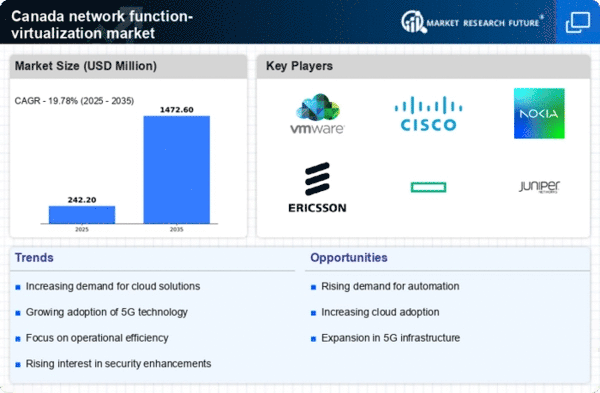Growing Demand for Cost Efficiency
The network function-virtualization market in Canada is experiencing a notable surge in demand for cost efficiency. Organizations are increasingly seeking solutions that reduce operational expenses while maintaining high performance. By virtualizing network functions, companies can minimize hardware costs and optimize resource allocation. This shift is particularly relevant in the telecommunications sector, where service providers are under pressure to deliver competitive pricing. According to recent data, the adoption of network function-virtualization can lead to a reduction in capital expenditures by up to 30%. As businesses strive to enhance their bottom line, the network function-virtualization market is poised for growth, driven by the need for more economical network management solutions.
Increased Focus on Network Agility
The network function-virtualization market is witnessing a heightened focus on network agility among Canadian enterprises. As businesses strive to adapt to rapidly changing market conditions, the ability to quickly deploy and modify network services becomes paramount. Network function-virtualization allows for dynamic resource allocation and service provisioning, enabling organizations to respond swiftly to customer needs. This agility is particularly crucial in sectors such as finance and healthcare, where service delivery must be both rapid and reliable. The market is expected to grow as companies recognize the strategic advantages of adopting agile network solutions, potentially increasing market penetration by 15% over the next few years.
Regulatory Compliance and Standards
In Canada, the network function-virtualization market is significantly influenced by the need for regulatory compliance and adherence to industry standards. As organizations navigate complex regulatory landscapes, the demand for solutions that facilitate compliance is increasing. Network function-virtualization enables businesses to implement security protocols and data management practices that align with regulations such as the Personal Information Protection and Electronic Documents Act (PIPEDA). This compliance not only mitigates risks but also enhances customer trust. The market is likely to see a rise in solutions that integrate compliance features, thereby driving the growth of the network function-virtualization market as companies prioritize regulatory adherence.
Advancements in Network Infrastructure
The network function-virtualization market in Canada is benefiting from advancements in network infrastructure. The transition from traditional hardware-based systems to more flexible, software-defined networks is reshaping the landscape. Innovations in 5G technology and high-speed internet connectivity are enabling organizations to leverage network function-virtualization more effectively. As a result, businesses can deploy services faster and respond to market demands with agility. The Canadian government has invested heavily in enhancing digital infrastructure, which is expected to further stimulate the network function-virtualization market. With projections indicating a growth rate of approximately 20% annually, the market is likely to expand as infrastructure improvements continue to unfold.
Rising Demand for Enhanced Customer Experience
In Canada, the network function-virtualization market is increasingly driven by the rising demand for enhanced customer experience. Organizations are recognizing that delivering superior service quality is essential for retaining customers and gaining a competitive edge. Network function-virtualization facilitates the implementation of advanced customer engagement tools and personalized services. By leveraging data analytics and real-time insights, businesses can tailor their offerings to meet specific customer needs. This trend is particularly evident in the retail and telecommunications sectors, where customer satisfaction is directly linked to service performance. As companies invest in technologies that improve customer interactions, the network function-virtualization market is likely to see substantial growth, with an anticipated increase in market size by 25% in the coming years.
















